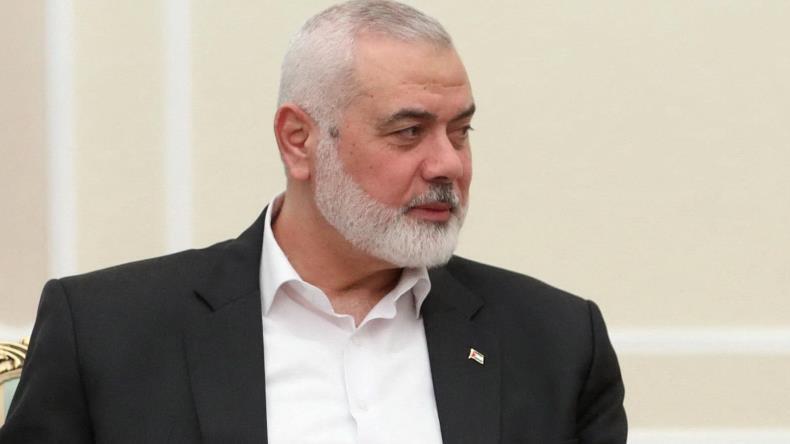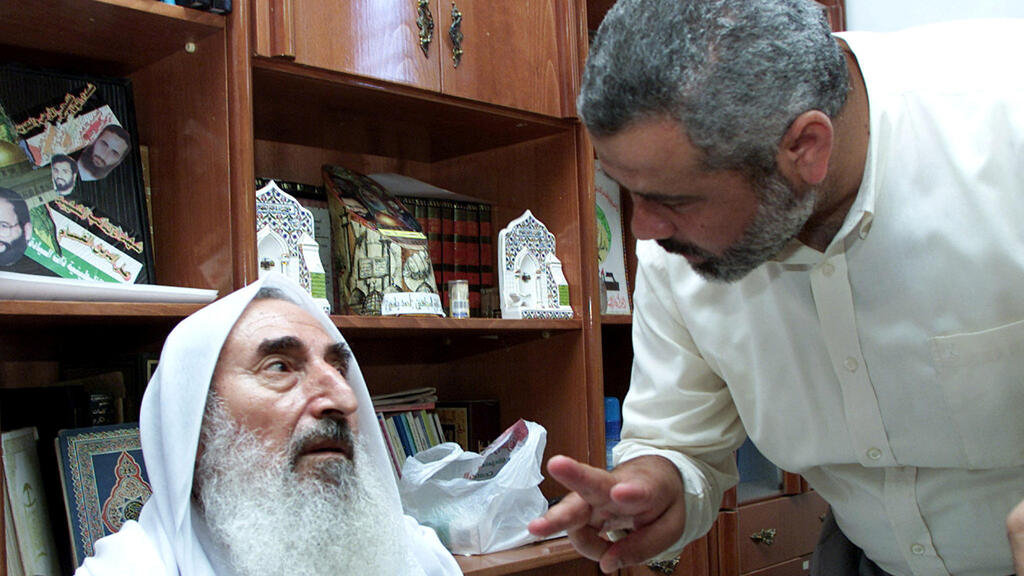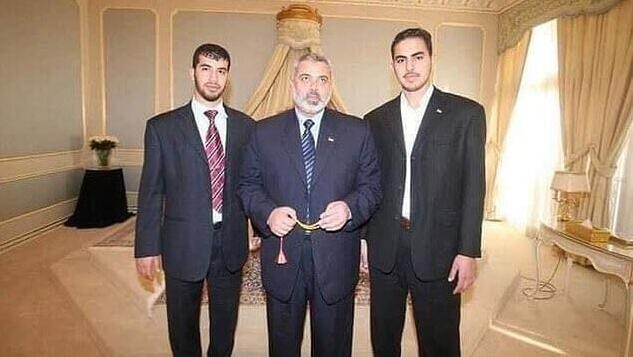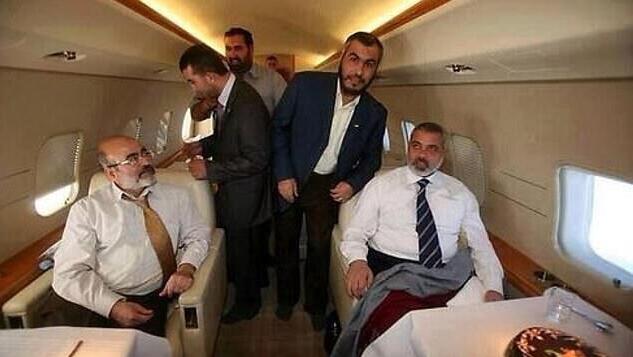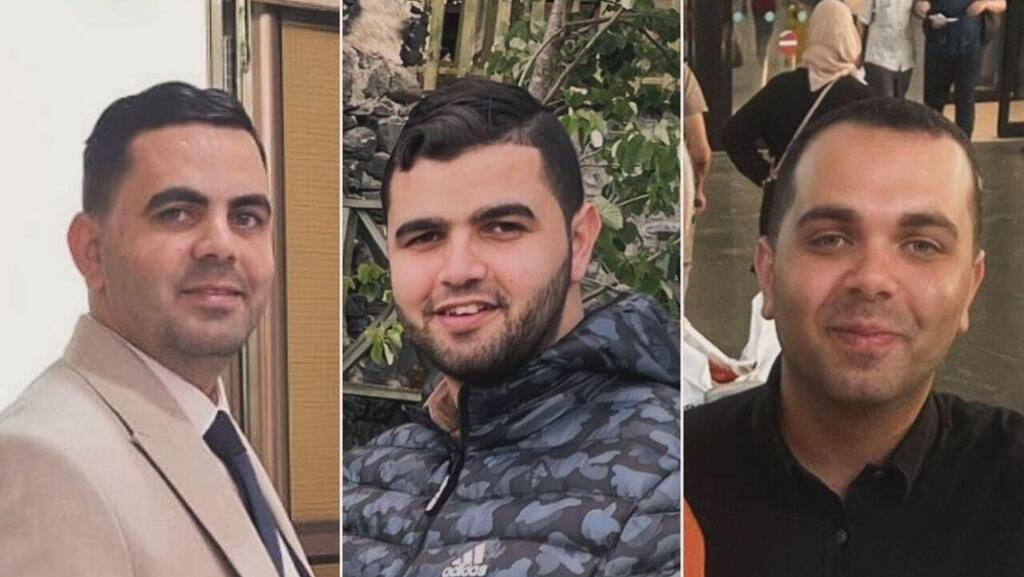Getting your Trinity Audio player ready...
On October 7, 2023, as the world watched footage of Hamas's brutal massacre in southern Israel, Ismail Haniyeh, the head of Hamas's political bureau, smiled while watching the scenes on TV from his hideout in Qatar.
Beside him were other leaders, celebrating as Hamas terrorists took control of an IDF jeep. "Let us offer a prayer of thanks for this victory for our people and our nation," Haniyeh said, flanked by his then-deputy, Salah al-Arouri. Al-Arouri was killed in Beirut in January in a strike attributed to Israel, and Haniyeh was killed overnight Wednesday in Tehran, Iran.
Haniyeh, 62, often referred to as "the hard face of Hamas's international diplomacy," was born in 1962 in the Shati refugee camp in Gaza to a poor refugee family originally from the village of Jura near Ashkelon. In his youth, he played soccer for local teams. Haniyeh studied Arabic literature at the Islamic University of Gaza and became active in the Islamic movement during his studies.
In 1987, the year the First Intifada broke out, Haniyeh graduated. He participated in the violent protests and was arrested twice for short periods by Israel. In 1989, he was imprisoned for three years at Ketziot Prison. Upon his release in 1992, he was deported to Lebanon along with hundreds of Hamas members by the Israeli government under Yitzhak Rabin. In 1993, he returned to Gaza and was appointed dean of the Islamic University of Gaza.
After Hamas founder Sheikh Ahmed Yassin was released from Israeli prison in 1997, Haniyeh was appointed his personal assistant, which helped him solidify his political status. His close relationship with Yassin boosted his authority among Hamas activists. Although he rarely engaged in Hamas's terror activities, he focused on the organization's social initiatives, such as establishing and managing charity associations, education, and health systems.
In December 2001, Haniyeh was arrested by Palestinian security forces along with other Hamas activists but was released shortly after. In September 2003, he was lightly injured when Israel attempted to assassinate Sheikh Yassin. In March 2004, following a series of attacks, Israel declared Hamas leaders as legitimate targets. On March 22 of that year, Yassin was killed, and a month later, his successor, Dr. Abdel Aziz al-Rantisi, was also assassinated. Several other senior Hamas figures were eliminated, leaving Haniyeh as a prominent leader in Gaza and the West Bank.
Ahead of the Palestinian Legislative Council elections in January 2006, Haniyeh was appointed head of Hamas's list and its candidate for prime minister, partly due to his avoidance of overt terror activities. After Hamas won the elections, Palestinian Authority President Mahmoud Abbas tasked Haniyeh with forming the new government. In March 2006, Haniyeh's government was approved by the Legislative Council and began its term.
The Hamas government, led by Haniyeh, was boycotted by most Western countries, spearheaded by Israel. This significantly reduced the flow of funds to the Palestinian Authority, severely affecting the living standards in the West Bank and Gaza Strip. Concurrently, residents suffered from political instability due to escalating violent clashes between Hamas and Fatah, which sought to maintain its leadership role. To end the international boycott and resolve the conflict, negotiations for a unity government began in 2006. Despite several crises and confrontations, an agreement was reached under Saudi auspices, and in March 2007, the Hamas-Fatah unity government, still led by Haniyeh, was approved by the Palestinian Legislative Council.
However, the violent conflict between Hamas and Fatah persisted, especially in Gaza. In June 2007, the conflict peaked when Hamas forces overran Fatah strongholds in Gaza. Fatah's resistance was weak, and Hamas quickly gained full control of the Gaza Strip. In response, Abbas dissolved the unity government and formed an emergency government led by Salam Fayyad. Hamas, on the other hand, declared that Haniyeh's government would continue to operate.
In 2007, Abbas decided to dismiss Haniyeh from his position as prime minister following the clashes in Gaza. Hamas refused to accept the decision, and Haniyeh continued to control Gaza. He led Hamas during Operation Cast Lead in 2008 and avoided public appearances for fear of his life. Haniyeh was instrumental in the 2011 Shalit prisoner exchange deal. Three years later, during Operation Protective Edge, the Israeli Air Force bombed Haniyeh's house, but he was not there at the time. In 2017, Yahya Sinwar was elected as Hamas's leader in Gaza, replacing Haniyeh, who moved to Doha, Qatar.
A popular speaker and billionaire
Haniyeh was known for his oratory skills and was a popular speaker. He lived in luxury hotels in Qatar and Turkey, frequently traveled on private jets, and his wealth was estimated at $2.5 billion by the German newspaper Bild."Other estimates suggested his wealth was even higher. Reports indicated Haniyeh purchased land in Shati for $4 million and acquired more properties, which he registered in the names of his 13 children.
Haniyeh's prominent sons include Maaz and Abdul Salam, who were often seen enjoying luxury hotels in Istanbul and Doha. Maaz was particularly known for his lavish lifestyle, evidenced by the jewelry he bought in Gaza and Qatar. The Saudi newspaper "Ilaf" published an article about one of Haniyeh's sons titled "Maaz Haniyeh - A Life of Extravagance, Alcohol, and Women." Abdul Salam faced criticism after it was revealed he transferred funds to his account as part of his role as Hamas's sports ambassador in the Shura Council.
Last year, the IDF spokesperson exposed further evidence of the disconnect between Hamas leaders and Gaza residents, highlighting the social and economic disparities. During ground operations in Gaza, documents and receipts were found showing thousands of dollars spent on luxury jewelry by one of Haniyeh's sons, an amount equivalent to almost two years' salary for the average Gazan.
Haniyeh's sons control the real estate sector in Gaza. They also own electrical generators, selling electricity to Gaza residents while receiving it for free. Gaza residents describe Haniyeh's sons as heavy drinkers and party-goers, often seen in the most luxurious clubs accompanied by women who are not their wives.
Family losses furing war and ICC warrants
On October 8, a day after the outbreak of the war, Haniyeh received a phone call from then-Iranian President Ebrahim Raisi (who died in a helicopter crash in May). "You have united the Islamic nation with this initiative; this is a victory," Raisi told Haniyeh about the massacre, the full extent of which was not yet known. Haniyeh thanked Raisi for the call and Iran's support, claiming the resistance had destabilized Israel and managed to overrun its positions, killing and capturing hundreds.
After Israel announced that none of Hamas's leaders were immune, Haniyeh understood that staying in Doha, Qatar, could be fatal. He moved between Qatar and Turkey and eventually planned to go to Iran. A month after the massacre, Haniyeh met in Qatar with the President of the International Committee of the Red Cross to discuss humanitarian issues related to the war, including the hostages held by Hamas in Gaza. Haniyeh chose not to comment on the meeting.
A month after the October 7 massacre, Haniyeh's eldest grandson and one of his granddaughters were killed in an Israeli strike in Gaza. In April, three of his children and three grandchildren were killed in an Israeli strike on the Shati refugee camp. In June, his sister was killed in a strike in Shati. Shortly after the deaths of his children were announced, Haniyeh appeared live from Qatar on Al Jazeera, saying, "With this pain and blood, we create hope, a future, and freedom for our people, our cause, and our nation."
He added, "Nearly 60 of my family members are martyrs, just like all the Palestinian people, and there is no difference between them. All Gazans have paid a high price with the blood of their children, and so have I. The occupation believes that targeting the families of leaders will break our people's resolve. We tell the occupation that this blood will only make us more steadfast in our principles and our attachment to our land. The deaths of my children will not affect Hamas's demands for a ceasefire."
In May, Karim Khan, the chief prosecutor of the International Criminal Court in The Hague, announced that due to the war, he had requested arrest warrants for war crimes against Prime Minister Benjamin Netanyahu, Defense Minister Yoav Gallant, Hamas leader in Gaza Yahya Sinwar, Hamas military wing leader Mohammed Deif, and Hamas political bureau chief Haniyeh.
Khan stated that the charges against Sinwar, Haniyeh, and Deif included "extermination as a crime against humanity, murder as a crime against humanity, taking hostages as a crime against humanity, rape and other acts of sexual violence as crimes against humanity, cruel treatment as a war crime, and severe personal dignity violations as a war crime." Khan added, "The world was shocked on October 7 when people were torn from their bedrooms, homes, and kibbutzim in Israel. People suffered greatly."



